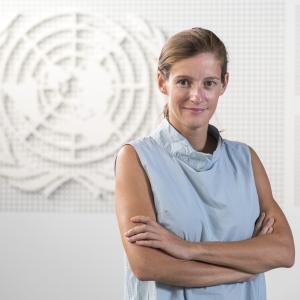Amidst the COVID-19 pandemic, on UN 75 anniversary, UN worldwide consultations conducted in Serbia reveal peoples’ strong call for action on climate change, universal access to health care, more solidarity and inclusion
23 October 2020
- ON UN Day 2020 strong appeal on climate action, universal access to healthcare and more solidarity from citizens of Serbia
Belgrade, 23 – October - 2020 - The UN is marking its 75th anniversary at a moment of great disruption amidst a global health crisis, with serious economic and social consequences for all people, and even more so for the most vulnerable.
In January 2020, the United Nations launched the global consultations to mark its 75th anniversary. This is the UN’s most ambitious effort to date to understand expectations of international cooperation. People of Serbia were also asked about their hopes and fears for the future. The results for Serbia reflect global results to a large extent. People in Serbia, including youth, identified three priorities – better care for the environment, universal access to health services, solidarity between countries and between people. People in Serbia see climate change, armed conflict, health risks and inequalities, including gender inequalities, as some of the most worrying threats for the future
“In Serbia, we are at a unique moment in time: a new government is coming to power, with the ability to shape an inclusive recovery from COVID-19, spearhead faster progress in ensuring the well-being of all people, reverse rising inequalities and harness the collective efforts from all communities. We are at a crossroads where our collective and individual futures are in all our hands, with a once in a lifetime opportunity to not just recover but build forward better, and create a world fit for every child and young person as they are the future of the world,” says Francoise Jacob, UN Resident Coordinator in Serbia.
The response to the pandemic, shows that global cooperation in the 21st century is about mutual responsibility and shared accountability, among countries, between people and their state, between generations.
Strong multilateral cooperation is the key to tackle these challenges. Global survey finds that 87% respondents believe that international cooperation is vital to deal with today’s challenges, and COVID made this more evident. Six in ten respondents believe that the UN has made the world a better place. Looking to the future, 74% see the UN as “essential” actor in tackling global challenges.
“On this 75th anniversary of the UN, as recognised by our Secretary-General, multilateralism is key, and it must be both globally connected and locally close to the minds of people. It must be inclusive, with the participation of the youngest and the oldest, women and men, businesses and charities, academia and philanthropy, religion and secularism. Serbia and her partners are frequent supporters of multilateralism, not only through active participation in the work of the UN multilateral bodies and active contribution to UN peace operations, but also through countless new regional initiatives to promote cooperation. We are grateful and we also remind all of you that Peace starts with each of us,” says Simona-Mirela Miculescu, Representative of the UN SG and Head of UNOB.
Newly appointed President of the National Assembly of the Republic of Serbia Ivica Dacic stresses that Serbia remains strongly committed to the goals and principles of the UN Charter, convinced that they are more relevant today than ever. "There is no doubt that the situation in which the world finds itself today requires joint action, solidarity and cooperation. The current COVID-19 pandemic has shown that no country is an isolated "island" and that, regardless of the level of development and existing capacities, it cannot cope with the complex consequences of this crisis on its own. The role of the UN and its specialized agencies is precisely in connecting and directing joint efforts towards overcoming the challenges we face. Therefore, continuous work is needed to adjust and strengthen the efficiency of the UN system, in order to be ready for current and some future challenges. I take this opportunity to express my gratitude to the UN for its support and assistance in the fight against the pandemic, primarily through cooperation on joint projects and advocacy for the improvement of our health system, "said Ivica Dacic. suffering, but also brought some unexpected positive effects, from cleaner air in densely populated urban areas to solidarity on a global and local level and rapid progress of innovation. Children, young people and adults master various technologies and new skills, because education through digital technologies and distance work have imposed themselves as a new normality," says Mr. Dacic.
While the coronavirus has brought intense suffering to many families and communities in Serbia and around the world, it has also brought some unforeseen positive side effects, from cleaner air in dense urban environments to global and local solidarity and fast progress in innovation. Children, young people and adults are mastering different technologies and gaining new skills as digital education and remote work options have emerged as the new normal.
The crisis, however, has also exposed and further deepened trends of inequalities within the society, including in Serbia, where it continues to impact vulnerable groups more severely.
The United Nations is now shaping its 2021-2025 strategy for its partnership with Serbia, as well as the response plan to the ongoing COVID-19 crisis. We plan to address both the needs to adapt to the crisis and the new world it has created, and to mitigate the impact of situations in the future by building forward better, accelerating the reform processes, nurturing trust and transparency, and anchoring sustainability and resilience in the country’s development vision.
To finalize and implement these forward looking agendas, Serbia can count on the expertise and support of all of its international partners, and most prominently the United Nations and the European Union, bilateral partners and International Financial Institutions. The effective use of resources that are available through a strong multilateral cooperation can boost Serbia’s ambitious forward-looking path.


















